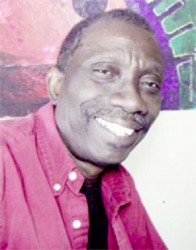Two Guyanese stage plays have been included in the new Performing Arts Syllabus recently introduced by the Caribbean Examinations Council (CXC) for its Caribbean Advanced Proficiency Examination (CAPE), which will be examined starting 2015.
Duenne by Paloma Mohamed which won the Guyana Prize for Literature in 1991 and the 1996 Guyana Prize-winning play Makanatali written by Harold Bascom are the two selected and there is a momentous feeling of enthusiasm about the potential to strengthen Guyana’s influences in the arts across the region. There is pride too in the fact that this is an accomplishment for Guyanese literature and arts – skipping the borders to wider horizons and imprinting on education.

Duenne and Makantali were among several Guyanese and Caribbean works suggested to the panel; about half a dozen new plays from contemporary playwrights in the Caribbean appear periodically on the CSEC and CAPE syllabuses.
Duenne
Duenne won the Guyana Prize for Literature 24 years ago, making Paloma Mohamed the first woman and youngest playwright to ever win the prestigious prize. She has since won two others in 1998 and 2003.
The play is about motherhood, womanhood and the choice of becoming one. Through three characters in the play: IT, an androgynous God figure; Madonna, a young woman who finds out she is pregnant with Aisha, the foetus, Mohamed discusses issues of the role of God and human in creation, abortion, human choice, abandonment and the right to life.
The name Duenne is taken from a mythological character of the same name in Afro-Caribbean folklore. A duenne is a child who has died before being christened and whose feet are turned backwards. The duenne is said to return luring other children to their deaths. In some versions of the story, the duenne presents as a baby crying in a sack which when taken up becomes heavier and heavier and cannot be discarded.
Mohamed has received a Cacique Award from Trinidad for her work which includes Duenne; a citation from the city of New York, and a Caribbean Secondary Schools Drama Association award, along with many other accolades and accreditations. The best award for her is to see her work produced year after year in universities and other places. Duenne has been on the syllabus at the University of Maryland and the Centre for Creative and Festival Arts in Trinidad for over ten years. “Just last December I saw a prize-winning production of Duenne in Trinidad, by a wonderful new director called Lalonde Ocaho. Ironically, it has never been staged once in Guyana. Maybe the time is now” Mohamed expressed.
“I have been doing this a long, long time but…I always feel humbled by local and international interest in my work. I am especially happy that through my work and that of my close friend Harold Bascom… Guyana finally got on the syllabus which has been a struggle sometimes because of the accessibility of little known works.” Mohamed went on to say that it is also a validation of one of the purposes of the Guyana Prize and the Caribbean Press which incentivise new writing to some extent. “In this regard Guyana is way ahead of most countries in the region which do not continuously fund these opportunities.”
When asked by The Scene what impact she wishes her play to have on Caribbean students and other drama enthusiasts, she said she wants them to interrogate and to understand something about themselves and the Caribbean/Guyanese condition from her plays. “I also hope I can be a good model for them as a writer, Caribbean person and cultural activist. I want them to know that it is possible with hard work to do and achieve this too.”
Mohamed is a senior lecturer in the faculties of Social Sciences and Medical Sciences at the University of Guyana. She is also chair of the Theatre Guild of Guyana, a founding director of Moray House and sits on several boards locally and internationally regarding the arts. She is also the founding influence behind CineGuyana. She developed the Allied Arts Drama Curriculum currently taught in some schools, 15 years ago, has served as an assistant chief examiner for Theatre Arts on CSEC and has also been on the panel of developers for the newly launched CAPE performing arts.
Makantali

Makantali won the 1996 Guyana Prize for Literature and became the first Guyana Prize-winning play to be staged in Guyana. Makantali won major awards after it was staged successfully at the Theatre Guild, directed by Malcolm DeFreitas.
Makantali ended Guyana’s dramatic contributions at Carifesta last year August in Paramaribo, Suriname. The adaptation was directed by Godfrey Naughton and performed by students of the Guyana National School of Theatre Arts and Drama.
The play surrounds a Guyanese pork knocker and the culture of his time in pre-independence Guyana. When asked to describe his play, the playwright summed it up this way: “Makantali is a multilayered story of a legendary porkknocker (a gold-seeker) who is stuck in a hellish spiritual place with his nagging wife, the saucy bush prostitute who ruined his life, and a chorus of other wretched spirits. From this painful purgatory, he has to find a way to influence a living, modern-day gold-seeker to do avoid repeating the mistakes that he, Makantali, made. Will he succeed in order to be guided, at last, to a peaceful place in his death; or will he fail and become a wretched demon roaming the earth?”
Makantali was inspired by the bush stories Bascom’s father told from his experiences as a young porkknocker himself. His father hailed from Vergenoegen, East Bank Essequibo where Bascom was born. In his play there is the character, Kenrick Barker (who becomes Makantali). Barker is the embodiment of Bascom’s father in many ways. The painful domestic circumstances that confront Barker and his wife Lillian were the actual domestic dilemma that confronted the writer’s own family. After Bascom’s father was retrenched from his job as an estate constable he had to make the difficult choice of leaving his family and going to the ‘bush’ to try his luck.
The play has a ton of biographical things running through it. Bascom especially enjoyed the bush-camp stories his father told about Captain Bob, his crew chief in the interior. Bascom has actually used the name Captain Bob as a key narrator in the play. It was written back in 1995, in Hadfield Street, Lodge, before Bascom migrated to the USA in 1996.
The playwright hopes this play evokes a sense of pride in Guyanese. He has grown to be an ardent believer in the saying that those who forget the past are doomed to repeat it. He also believes, steadfastly, that the fate of those who never knew of the past is more pathetic.
The four-act play is only available as an eBook that students will have to purchase online. It costs US$14.95 and can be purchased directly at https://gum.co/ makantali. Contact can also be made with Bascom via makantalie2@gmail.com, or haroldbantu@aol.com.
More online selling points will soon be available, but parents and students will soon be able to access the buying link to the eBook through the Makantali Facebook Page, which is currently being built




